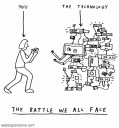Technology’s secret revenge.
 Some people claim that technology improves our lives by improving our standard of living. I certainly don’t deny that since we have less physical work to do, we now have more leisure time than ever before. Before I get any further, I should say that it is up to each of us to decide what we do in our leisure time and I have no business in commenting about that. What I would like to discuss here instead are the many side-effects of some recent advanced technologies…
Some people claim that technology improves our lives by improving our standard of living. I certainly don’t deny that since we have less physical work to do, we now have more leisure time than ever before. Before I get any further, I should say that it is up to each of us to decide what we do in our leisure time and I have no business in commenting about that. What I would like to discuss here instead are the many side-effects of some recent advanced technologies…
As technology relentlessly progresses, the most obvious question that comes to mind: what happens to our long-standing face-to-face human interactions? I’m not merely refering to writing electronic e-mails to your friends or speaking with a relative over the telephone. There are many other human tasks besides communication which now take place with the ‘aid’ of technology. We join online social communities and make virtual friendships. We utilise virtual banking and online bill payments. We attempt to find real mates using virtual dating databases. We take part in virtual gaming entertainment and even participate in virtual sex.
Sometimes it seems as if our entire lives are mediated through technology. It appears to me that one of technologies’ secret aims is to over-ride all direct human-human interactions. Yes I realise that due to the internet we are in a sense ‘connected’ to more people than ever before. Yet we can’t talk to them all, so we have to narrow down our options. But is this a good or a bad thing? Lately, it seems we don’t have time to really talk to anybody. Have we already gone too far? Have we become victims of our own high-technology? I believe that far from connecting us, technology is making us more and more anti-social.
Below, I’ve commented on some of the most recent technologies and their possible negative consequences…
THE INTERNET:
In the last decade, the internet has become a fantastic resource to serve humanity. One of the reasons for its success is the speed at which you can freely retrieve this information. So much so, the immensity of it is truly overwhelming! The trouble is, there are already countless choices to make in this world, and they’re growing at an exponential rate. So much so, we end up with a major case of «future shock».
Have you ever been in a situation where you have been completely bored and just did not have a clue what to search for? Completely stumped, you probably typed into google: «I do not know what I’m searching for» or «entertain me» or «purple kettle». You probably walked away from the computer at that point, because every single search result brings up way too many possibilities to deal with. On the other hand -like me- you might feel that a computer without an internet connection is something to be pitied; lacking connections with the outside world, it’s like a little oasis isolated in a vast expanse of desert.
You know, I only recently found out what twitter does… as if people care. It’s pretty sad when you stop to think about it. Do they really think that anyone truly cares what they’re doing every single moment in time? Not me. Personally, I think there’s more to it than just telling people what you’re up to in short bursts; it’s more like an outlet ‘solution’ for all those hyperactive people not being able to concentrate on one thing for more than 5 minutes at a stretch. You know the ones. They can’t sit still & they’ve simply got to check and update things all the time. Do they ever write «I’m wasting my time twittering»?? Again, what the hell has happened to REAL friendships in the last 5-10 years? I’d much rather talk to my friends in a real enduring conversation.
E-MAIL:
E-mail is one of the most wonderful inventions of our modern time. Email gives us the opportunity to respond when it most suits us. This is probably just as well, because if we had to respond to everything instantly, we’d all go insane… but it also makes life slightly more complicated too. When do I respond to my emails? In which order? Do I delete this or mark it as spam? Which folder should I put this into? How often do I backup my files? Do we have actually more spare time to do other things or less, in reality?
ONLINE FORUMS:
Last year I decided to start my own forum. It was mainly a business decision (to gain a certain level of respect) but I also did it in order to meet more like-minded people in Tenerife & improve my written level of Spanish. Since that moment, I’ve made 370 out of a total number of 605 posts. Other than to buy a set of wheels and brakes, I have not actually met anybody! I expect that forums really take a lot of time to achieve that snowball effect -but still- if new aquaintences is what I wanted, it’d be sooooo much easier for me to join a local cycling club. In the same time period, I have had no trouble speaking to the downhill mountainbikers at the local bus stop and it takes a hundred times less effort to initiate a real conversation with them.
While entertaining they can be, healthy they are not (forums that is, not mountainbikers). My new theory is that, online forums actually attract freaks. Where do people with no real friends go? They go where they can easily find requisite social interaction. Forums. Online, people have learned that they can say pretty much what they like from the safety & anonymity of their own computer terminals. They are immune to the types of negative physical responses that they’d get in real life. So it’s only natural that the trouble makers, or ‘trolls’, often dwell in forums.
Far from building truly interacting communities, I’ve come to realise that the majority of online forums are full of inidvidual members who never actually meet the other members in real life. To prove my point, just try diverting any forum debate into a telephone conversation. The last time I did that with a forum moderator, I was promptly banned. Incidently, that’s another reason I decided to administer my own forum.
I could not agree more with an article written by another blogger about the negative consequences of ATM transactions and other time-saving devices:
On the way home on the train this evening, I saw a sign advertising Chase’s new feature that allows one to set ATM preferences so that you can «get cash twice as fast».
How long does the typical ATM transaction take? I’ll admit that I’ve never timed it (although you can be sure that I’m going to), but I’m guessing less than ninety seconds. So. Yeah. I REALLY need to shave that 45 seconds off my cash withdrawal time. It’s going to change my whole day.
I know it sounds like I’m being sarcarstic, but in fact I think that it IS going to change my whole day–and yours too–and the change isn’t for the better.
Remember when you had to go to the library and sort through drawers for the right roll of microfiche and pop it into a machine and turn and turn and turn and focus in order to find an old magazine or newspaper article? I’m talking 1988 here, not the forties.
Okay, quick show of hands: how many of you have complained out loud about how long it takes a newspaper article or other resource to load online? We cut out the travel time, we cut out the sorting through the cabinets, we cut out the scrolling, then we even cut out the dial-up delay, and now we’re groaning, «this is so slooooowww» when it takes 30 or 45 seconds for a web page to display.Â
Now, I’m not a stop-and-smell-the-roses kind of girl by any stretch of the imagination, but I have to say that I think maybe driving to the library was much healthier for us, as individuals and as a culture. I say that in part because we interacted with live people more, and were less rushed when we did. I say it partly because downtime like that you spend driving alone gives you time and space to think. And I say it partly because I think there’s something inherently unhealthy, mentally and physically, about feeling the need to shave that extra 45 seconds off our ATM transactions.
I don’t mean to lay this all at Chase’s doorstep, though I do think Chase is the root of all evil (we’ll talk about that another day). I see it at the gas station where «Speedpass» promises to save me the time it takes to actually INSERT MY CREDIT CARD, since I just have to wave it at the machine. I see it at the grocery store where «one touch» payment is so «convenient» that we’ve all conveniently overlooked how creepy and 1984 it is…
So here’s my plan. I’m not signing up for one touch payment. I’m going to write checks just like we did back in prehistoric times, and if that takes an extra 30 seconds I’m going to use that time to wish the clerk a nice evening and smile at the person behind me (whose brain will probably be exploding because I’m writing a check). I’m going to leave my ATM preferences unset and go ahead and take that full 90 seconds to withdraw cash from the machine… And I could be wrong, but I suspect that all those «wasted» seconds are going to add up and reappear at the end of my life, when I live a lot longer without the pressure of having to complete all of my transactions in under a minute. Source
GLOBAL POSITIONING SYSTEMS (GPS) AND OTHER MOBILE TECHNOLOGIES:
GPS units have their uses, but what exactly is the point of owning one in a city? Are we that afraid of asking someone on the street for directions? I’m willing to bet it’s a quicker alternative. People that shunt GPS and other palm-sized mobile electronic devices around with them everywhere are more likely to be fiddling with software and coordinates than interacting with real members of society. I can think of one unintended consequence: social anxiety disorder. Here’s a thought: just try asking someone for the nearest chemist the next time you need one.
Based on the proximity of nearby communication cell towers, modern mobile phones are even capable of showing you a whole host of services which are in your proximity. Would it hurt to actually use your eyes and look for a suitable place to eat?!
I think we have to ask ourselves WHY we are creating technological innovations like these. Why do we suddenly demand everything of technology and nothing from our fellow peers? Do we not trust anyone anymore? Or do we believe they won’t have time to respond to our requests? Have we forgotten that people like to feel needed?
One step further. Could these simple observations in fact be linked? What I mean by that is: are we unwittingly setting ourselves up in an extraordinary viscious cycle? Because of our stressful life, we’re more likely to react with poor judgement and little control in certain situations; in order to avoid these potential hazardous scenarios, we buffer human contact by the use of technology; this in turn accumulates our stress levels and leads to ever-more anti-social behaviour.





Discussion Area - Leave a Comment